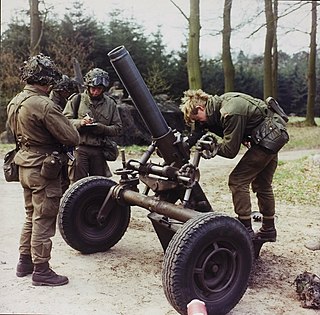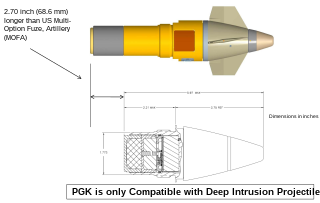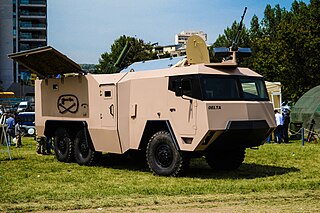Related Research Articles
The Joint Direct Attack Munition (JDAM) is a guidance kit that converts unguided bombs, or "dumb bombs", into all-weather precision-guided munitions. JDAM-equipped bombs are guided by an integrated inertial guidance system coupled to a Global Positioning System (GPS) receiver, giving them a published range of up to 15 nautical miles (28 km). JDAM-equipped bombs range from 500 to 2,000 pounds. The JDAM's guidance system was jointly developed by the United States Air Force and United States Navy, hence the "joint" in JDAM. When installed on a bomb, the JDAM kit is given a GBU identifier, superseding the Mark 80 or BLU nomenclature of the bomb to which it is attached.

A mortar is today usually a simple, lightweight, man-portable, muzzle-loaded cannon, consisting of a smooth-bore metal tube fixed to a base plate with a lightweight bipod mount and a sight. Mortars are typically used as indirect fire weapons for close fire support with a variety of ammunition. Historically mortars were heavy siege artillery. Mortars launch explosive shells in high-arching ballistic trajectories.

The M252 81 mm medium weight mortar is a British-designed smooth bore, muzzle-loading, high-angle-of-fire weapon used for long-range indirect fire support to light infantry, air assault, and airborne units across the entire front of a battalion zone of influence. In the U.S. Army and U.S. Marine Corps, it is normally deployed in the mortar platoon of an infantry battalion.
Pansarsprängvinggranat m/94STRIX is a Swedish endphase-guided projectile fired from a 120 mm mortar currently manufactured by Saab Bofors Dynamics.

The Soltam K6 is a 120 mm mortar that was developed by Soltam Systems of Israel. It is the long-range version of the Soltam K5 and has replaced older systems, such as the 107-millimetre (4.2 in) M30, in several armies including the United States Army. It is much lighter than the M30, has a greater range, and can sustain a rate of fire of four rounds per minute, while the M30 could sustain only three.

A guided bomb is a precision-guided munition designed to achieve a smaller circular error probable (CEP).

The M982 Excalibur is a 155 mm extended-range guided artillery shell developed in a collaborative effort between the U.S. Army Research Laboratory (ARL) and the United States Army Armament Research, Development and Engineering Center (ARDEC). The Excalibur was developed and/or manufactured by prime contractor Raytheon Missiles & Defense, BAE Systems AB and other subs and primes in multiple capacities such as Camber Corporation and Huntington Ingalls Industries. It is a GPS and inertial-guided munition capable of being used in close support situations within 75–150 meters (250–490 ft) of friendly troops or in situations where targets might be prohibitively close to civilians to attack with conventional unguided artillery fire. In 2015, the United States planned to procure 7,474 rounds with a FY 2015 total program cost of US$1.9341 billion at an average cost of US$258,777 per unit. By 2016, unit costs were reduced to US$68,000 per round. Versions that add laser-guidance capability and are designed to be fired from naval guns began testing in 2015. By October 2018, over 1,400 rounds had been fired in combat.

The 2R2M is a vehicle-mounted, rifled 120 mm heavy mortar produced by Thales of France. It is derived from the MO-120-RT towed mortar. The 2R2M is in service with 5 nations.

The XM395 Precision Guided Mortar Munition (PGMM) is a 120 mm guided mortar round developed by Alliant Techsystems.

The MO-120 RT or MO-120-RT is a French heavy mortar. The RT in the designator stands for rayé, tracté, which means rifled, towed. The MO-120-RT is currently used by the French Army, and has also been exported to more than 24 foreign countries or in some cases, produced under licence. It is issued to artillery units, where it complements artillery guns and systems; although infantry units operate it in some countries.
The Korean Smart Top-Attack Munition (KSTAM) is a smart munition intended to be launched from the gun of a main battle tank, namely the South Korean K2 Black Panther. Comparable systems include Diehl Corporation's Spear, DRDO SAMHO, CMI Defence and Luch Falarick 120, Israeli Aerospace Industries LAHAT, Nexter Systems Polynege, Alliant Techsystems STAFF and MRM-KE, Raytheon Technologies MRM-CE, and the two final companies' TERM.

The M1156 Precision Guidance Kit (PGK), formerly XM1156, is a U.S. Army-designed precision guidance system to turn existing 155 mm artillery shells into smart weapons. The prime contractor was Alliant Techsystems – later merging with Orbital Sciences Corporation to form Orbital ATK, in turn being taken over by Northrop Grumman and renamed Northrop Grumman Innovation Systems – and the industry team includes Interstate Electronics Corporation. By April 2018, more than 25,000 PGKs had been produced.
IMI Systems, previously Israel Military Industries, also referred to as Ta'as, was an Israeli weapons manufacturer. The company manufactured weapons, munitions and military technology mainly for the Israeli security forces.

A precision-guided munition (PGM), also called a smart weapon, smart munition, or smart bomb, is a guided munition intended to hit a specific target, to minimize collateral damage and increase lethality against intended targets. During the Persian Gulf War guided munitions accounted for only 9% of weapons fired, but accounted for 75% of all successful hits. Despite guided weapons generally being used on more difficult targets, they were still 35 times more likely to destroy their targets per weapon dropped.
Cannon-launched guided projectiles (CLGP) are precision-guided munitions launched by howitzers, mortars, tank guns, and naval guns. Those projectile main propulsion system is the initial kinetic shoot, directed as much as possible toward the target. A secondary GPS or geocoordinates-based system then corrects the trajectory to increase target accuracy and fall closer to the target. This system relies on electronic guidance and pre-programmed coordinates, submitted to the round before its launch.

The GMM-120 self-propelled mortar is a proposed armoured mortar carrier concept with a 120 mm automated mortar station. The system is being developed by STC Delta.

A loitering munition, also known as a suicide drone, kamikaze drone, or exploding drone, is a kind of aerial weapon with a built-in warhead that is typically designed to loiter around a target area until a target is located, then attack the target by crashing into it. Loitering munitions enable faster reaction times against hidden targets that emerge for short periods without placing high-value platforms near the target area and also allow more selective targeting as the attack can be changed mid-flight or aborted.
The Guided Multipurpose Munition (GMM) is an infantry precision guided munition being developed by Saab Group and Raytheon.

The Iron Sting is a 120 mm guided mortar munition developed by Elbit Systems of Israel, currently in use by the Israel Defense Forces (IDF). The Iron Sting is designed for use with the "Keshet" and "Hanit" mortars in service with the IDF's Infantry Corps. It features dual guidance: laser and GPS, allowing for precise strikes, including in urban areas, minimizing the risk of collateral damage.
References
- ↑ "GMM 120 - 120mm Guided Mortar Munition". Israel Military Industries . Archived from the original on 7 April 2014. Retrieved 6 April 2014.
- ↑ "Israeli army tests GPS-guided mortar shell". i24news . Retrieved 6 April 2014.